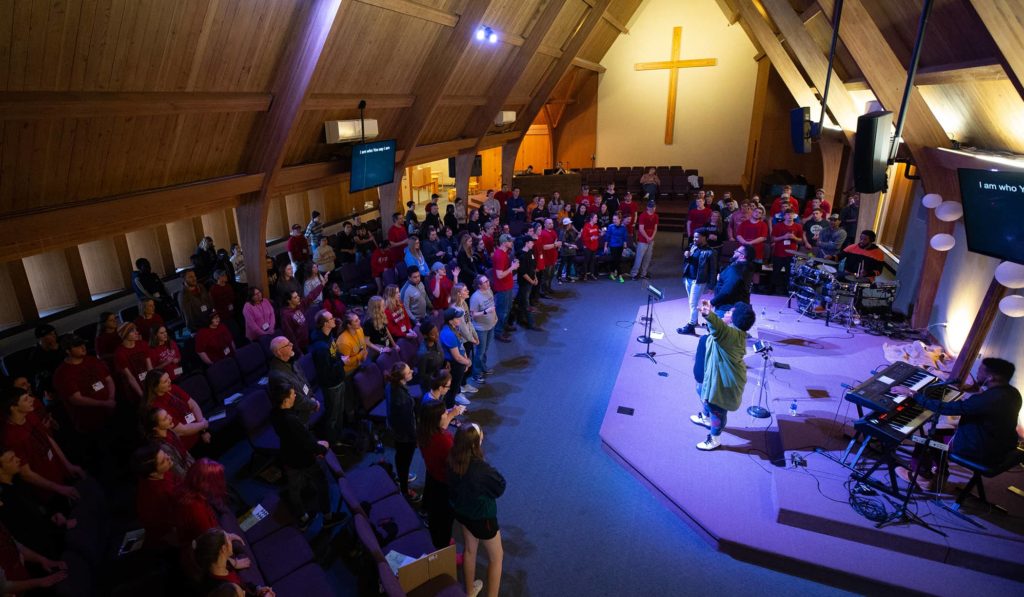From the inception of congregational vitality ministry within the Evangelical Covenant Church, we have introduced pastors and congregations to the fact that leadership is both an active and reflective task.
On the one hand, we recognize that effective leaders must respond in the moment to what is happening. On the other hand, leaders must be able to step back from their current moment and assess what is happening from a wider perspective as well. Ron Heifetz and Marty Linsky are two voices who have been primary advocates over the years for this two-dimensional understanding of leadership. The metaphor they utilize to differentiate these two functions of leadership is the dance floor and the balcony.

Relative to this, recently the Northwest Conference staff read through Gil Rendle’s book, “Quietly Courageous: Leading the Church in a Changing World.” In one section of his book, Rendle also highlights Heifetz and Linsky’s leadership metaphor of the dance floor and the balcony as important to leading congregations effectively.
He explains: “The dance floor is where the action happens. It is the active place where any group must engage in order to move their work ahead. However, the dance floor (including the committee room) is the least thoughtful space for leaders and workers because it is driven by immediacy that prompts a dependence on what people already know. It is reactive space. In contrast, balcony space is where the leader takes people to withdraw from the dance floor of activity in order to become more reflective.”
It is a leadership discipline to periodically step away from the action—off the dance floor and onto the balcony—in order to establish adequate time and distance from the action to seek greater perspective on one’s current situation. It is intentionally creating space to foster more honest reflection and learning for the group.
According to Rendle, one of the primary tools leaders have to utilize balcony space effectively is open-ended questions. And in his work with congregations over the years, Rendle has developed a series of “cascading” questions of inquiry which invite people into balcony conversations of listening and learning about their own work. Cascading implies only that the questions are arranged in a sequence.
The work of leaders would be to use this list to determine which is the critical conversation of inquiry the people most need to address at any given moment in order to move ahead. What part of their story do they need to revisit to remind themselves to be bold and faithful? What part of their story do they need to question, examine, challenge or rewrite in order to gain more clarity about their purpose? What part of their work do they need to examine in order to learn more?
Following are Rendle’s suggested questions:
Descriptive Work:
1) Who are we, now? (The identity question)
2) Who is our neighbor, now? (The context question)
Discernment Work:
3) What does God call us to do, now? (The purpose question)
The Work of Boldness and Courage:
4) In order to address God’s call, what difference do we believe God has for us to make in the next 3-5 years? (The outcome question)
5) What would it look like in 3-5 years if we are faithful and fruitful with our call? (The possibility question)
Implementation Work:
6) How will we do it? (The strategy question)
7) How will we measure our progress toward fulfilling our call? (The metrics question)
Learning Work:
8) What have we learned from our experience? (The learning/evaluation question)
9) What re-shaping or changing do we need to work on because of what we have learned? (The ready-aim-fire question)
When considering all that we have been through since March 2020, couldn’t we all benefit from some additional balcony space and process as we discern moving forward in our sense of mission? If so, maybe Rendle’s guiding questions can provide you with a helpful framework for your process.
After all, leadership is both active and reflective.
Seth Bjornrud, Lead Pastor at International Falls Covenant Church, recently shared how he and a church member lived into their Relational Covenant, practicing civil engagement with each other in processing a disagreement over wearing masks at church.
May this encourage us all as a real-time example of godly conversation and committed community:
On Aug. 1, I accepted my first call to be Lead Pastor of the same church where I had served as youth and worship pastor. As I prayed about what my first sermon series would be, I knew it had to be about how we live together as brothers and sisters of Christ.
I found a document in our church called a “Relational Covenant” that was drafted by the leadership team over 10 years ago as a rule of life for how to treat each other and handle conflict in our church.
On the fourth Sunday of the series, I preached our promise to be “Considerate and Respectful.”
Under that heading our Relational Covenant says:
- We will offer our opinions with clarity and humility
- We will build each other up and not tear down
This is not the way we see disagreements being handled very often in our politically-polarized world. As I was preparing my message, I realized that I had experienced this Relational Covenant in action with someone in my congregation.

This person (who I will call John) told me one day that he did not agree with our church’s decision to require masks at our services during the COVID-19 pandemic. In our conversation we were able to discuss our disagreement while being considerate and respectful of each other. When we left, neither of us changed our opinions but we left appreciating each other more.
I asked John to join me up front on a recent Sunday where I shared about our conversation and we both got to answer these three questions in front of the congregation.
- What mischaracterization is said of your side of the argument that do you not appreciate?
- What is a strong point of the other person’s argument that challenges you and makes you think?
- What do you appreciate about the other person in your conversation with each other?
It was communion Sunday, and so we planned after the questions to take communion together in front of everyone else to show people how we can be considerate and respectful—even in our disagreements.
Jesus taught us not just to love the people who agree with us, but to love everyone. To me John is not a monster or an “other.” John is my brother in Christ.
 God has strategically placed churches in rural areas and small towns in order to impact our culture for the Kingdom of God. This conference will provide pastors and board members of these churches information on how to minister effectively, encourage them to see their unique role in God’s plan, and help them take the steps that can impact their world for all of eternity.
God has strategically placed churches in rural areas and small towns in order to impact our culture for the Kingdom of God. This conference will provide pastors and board members of these churches information on how to minister effectively, encourage them to see their unique role in God’s plan, and help them take the steps that can impact their world for all of eternity.
Join keynote speaker, Leith Anderson of Wooddale Church and many other incredible speakers for a time of encouragement, growth, and resourcing.
Date: March 11, 2017
Location: Cornerstone Church, Litchfield, Minnesota
Registration Cost:
Early Bird Pricing Ticket (through February 1, 2017)
$ 34 per person
$ 29 per person when you register 4 or more people from the same church.
Includes lunch!
This discounted price is only valid through February 1. All registrations thereafter will be $39 per person.
To register or for more information, please visit www.growmn.org.